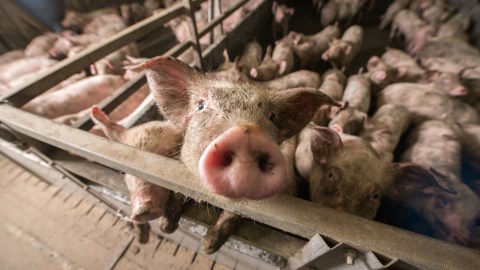Peter Singer on the conversation that forever changed his life

- A plant-based diet can help save the planet from climate change and lessen the risk of another pandemic.
- Since 1975, worldwide consumption of meat has increased from 112 million tons to more than 300 million tons.
- Singer’s call for a boycott of factory farms is meant to help alleviate some of the suffering that humans are inflicting on animals.
Switching to a plant-based diet is not merely a symbolic gesture. Nor need it be an attempt to isolate oneself from the ugly realities of the world, to keep oneself pure and so avoid responsibility for the cruelty and carnage all around. Avoiding animal products is a practical and effective step toward a healthier life-style for yourself that will also have other, even more important consequences. It can contribute to reducing the misery we inflict upon animals, to making more food — not less — available to feed a growing world population, to saving the planet from catastrophic climate change, and to lessening the risk of another pandemic.
The people who profit by exploiting large numbers of animals do not need our approval. They need our money. The purchase of the flesh, milk, and eggs of the animals they rear is the most important form of support that factory farmers seek from the public (although in many countries, government subsidies certainly help). Giant agribusiness corporations will use intensive methods of animal production as long as they can sell what these methods produce. Their profits give them the resources needed for blocking far-reaching change and they will continue to defend themselves against criticism by saying that they are only meeting the demand from the public.
Hence the need for each one of us to stop buying the products of the animal factories. Until we do that we are contributing to their continued existence, prosperity, and growth, and all the cruel practices used in rearing animals for food. In the supermarket and at the dinner table, we have an opportunity to do something more than merely talk about how someone else should do something to stop the cruelty. It is easy to take a stand against bullfighting in Spain, eating dogs in South Korea, kangaroo shoots in Australia, the Canadian seal slaughter, or the bloody massacre of dolphins in Japan; but we reveal our real values when the issue comes into our own home.
If we are continuing to eat chicken produced by breeding birds who are in pain because their legs cannot support their fast-growing bodies, or meat from pigs kept confined indoors all their lives, it is hypocritical of us to object to eating dogs. It is when we eat that the consequences of speciesism intrude most directly into our lives. Boycotting the factory production of animals enables us to attest to the depth and sincerity of our concern for nonhuman animals.
To make this boycott as effective as possible, we must not be shy about what we are refusing to eat and why. I first learned of the existence of factory farming from Richard Keshen, a fellow-student at Oxford University with whom, one fateful day, I had lunch. He asked whether a dish we were offered had meat in it and, when told that it did, chose something else. I asked him what his problem with meat was. Within a month of that initial conversation, I became a vegetarian. Being asked about your food choices is an opportunity to tell people things they may not know about how the animals they are eating were treated. One conversation changed my life, and my views have since influenced many others. If a boycott can reduce animal suffering, then we must encourage as many as possible to join in, and we can’t do this unless we ourselves set the example.
If avoiding factory farm products is a form of boycott, then what do we do if the boycott isn’t working? That question has to be asked, because since I called on readers to boycott meat in the first edition of Animal Liberation (1975), worldwide consumption of meat has increased from 112 million tons to more than 300 million tons, with virtually all of the additional meat coming from factory farms. A large part of that increase is due to the world’s population having doubled in size during that period, and most of the rest is the result of an otherwise welcome reduction in poverty, especially in Asia. Meat is expensive, and so people consume it only when they can afford to do so.
China’s per capita meat consumption tripled between 1990 and 2021, and Vietnam’s quadrupled over the same period, while there were also sharp increases in Brazil, India, Indonesia, Mexico, Pakistan, and South Africa. Countries that were already affluent in 1990 did not have such a clear trend, with moderate increases in Australia, Israel, Norway, and Japan, more modest increases in the United Kingdom and United States, and decreases in Canada, New Zealand, and Switzerland. In a promising sign, meat consumption in both Germany and Sweden declined by more than 12 percent in the period from 2011 to 2019.
Boycotting the factory production of animals enables us to attest to the depth and sincerity of our concern for nonhuman animals.
Clearly, my call for a boycott of meat has been a dismal failure. Does that mean that, for people who are persuaded by the case I make, there is no point in continuing it? With indirect boycotts, that may be the case. For example, when People for the Ethical Treatment of Animals asked its supporters to boycott Air France because it was transporting thousands of wild-caught monkeys to laboratories, that boycott was either going to succeed in getting Air France to change its policies regarding transporting primates to laboratories, or it was going to fail and achieve nothing. (Fortunately, it succeeded.)
Boycotts aiming at changing the conduct of a company or a government are often like that, win or lose, with little ground in between those extremes. If you are boycotting one product — in this example, passenger flights — that a company sells in order to persuade that company to stop doing something completely different, like transporting monkeys, it would be reasonable to say that if you aren’t succeeding, there is no point in continuing the boycott.
Boycotting factory farms is different because it is a direct boycott of the product to which the boycotters object, and hence it has a direct impact on the amount of suffering that the boycotters are trying to prevent. The number of animals that factory farms raise and slaughter increases or falls directly in response to the demand for those products. To cease to support the broad movement against buying them would only lead to more animals leading miserable lives on factory farms. Even if the trend is not going in the direction we hope, that’s no reason to make things even worse.





